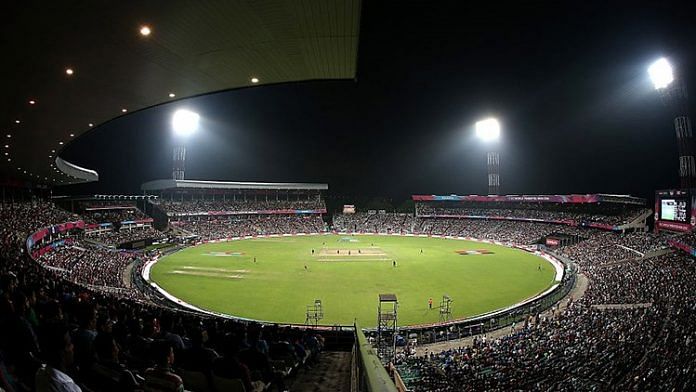
Thank you dear subscribers, we are overwhelmed with your response.
Your Turn is a unique section from ThePrint featuring points of view from its subscribers. If you are a subscriber, have a point of view, please send it to us. If not, do subscribe here: https://theprint.in/
Here’s something to distract us amid all this Covid sombreness.
There was this Indian batsman; an opener from Hyderabad actually, named Kenia Jayantilal. He was selected for that same 1971 West Indies tour on which another young player from Bombay (now Mumbai), named Sunil Gavaskar, was picked. Both were yet to make their debuts but had performed well in domestic matches.
For the first Test in Kingston, Jayantilal was chosen ahead of Gavaskar, who was down with some sickness. Jayantilal was batting on 5 with one boundary, when he nicked one. Gary Sobers – a great allround cricketer who could probably be selected for his catching prowess alone – jumped to his right, supposedly his weaker side, to pick the catch inches above the ground. That was the only inning India batted in that Test.
For the next Test at the Port of Spain, Gavaskar was handed his debut. He replaced Jayantilal as the opener. Gavaskar was batting on 12 when he too nicked one to the slips. The ball went comfortably at the midriff region to, whom else, Gary Sobers. Lo and behold, Sobers dropped it!
Gavaskar went on to become a legend, Jayantilal never again played for India.
*****
Cut to 1990, India is touring England. Setting is Lord’s this time. A skiddy swing bowler, Sanjeev Sharma, is bowling in full rhythm. Old warhorse, Graham Gooch is in the form of his life. He is batting on 36 when he is deceived by a Sharma delivery that swung away rather late at good pace. Ball goes comfortably to Kiran More, a fairly good wicketkeeper. But he spills the chance. Gooch went on to score 333 runs in that inning – the first ever triple century against India. England scored 650 odd runs at the loss of only 4 wickets; Gooch declared soon after he was eventually dismissed.
What happened next? India somehow avoided the follow-on. Kapil scored 77 not out towards that, including 4 consecutive sixes (yes, India’s no. 11 Hirwani duly got out the first ball he faced after Kapil’s sixes).
Gooch scored another ton in the second inning, falling this time to Sharma. India went on to lose that Test, and the series (1-0). That loss also started India’s horrible run of overseas losses. For about the next decade and half, India would struggle to win a single Test abroad.
Sanjeev Sharma took 3 of the 8 wickets that England lost in that Test, but he never again got to play for India.
****
Cut to 2014, opening in an ODI at Eden Gardens, Rohit Sharma is trying to take the charge to the visiting Sri Lankans when he got a thick edge that flew to the third man. Thisara Perera dropped a sitter. Rohit was on 4 then.
What happened next? Rohit went on to score 264 runs, the highest ever score in an ODI.
As a follower of Indian cricket, these are my 3 most remarkable catch drop moments. And though we can’t grudge a good catch taken, the one of Jayantilal adds to the irony.
I was telling this story in my Cricket Group, when a respected English Gentleman – a former cricket columnist – told us another story involving a catch drop of an era not that long ago.
August 1968, Fifth Test, Venue: The Oval
Basil D’Oliveira (“Dolly”), a late call up after having been dropped, for arguably political reasons (Dolly was an England international cricketer of color, with South African background), is on 31 when he edges a presentable catch to Australia’s respected keeper Barry Jarman, who drops it!
What happened next? Dolly goes on to make 158, helping England to a match winning total. Yet, he is omitted from the winter tour party to his native South Africa for reasons that have never been made clear.
Cue public fury and a face-saving change of heart when Dolly was selected to join the squad as an injury replacement. Then South African Prime Minister (name not important) making it clear that Dolly’s selection would in the visiting England team would not be acceptable (think of it now – a country’s Prime Minister, no less, is interfering in a squad selection of a visiting team; that too on the basis of a player’s race – it happened just about 50 years ago). That led to the cancellation of the tour, the rise of the anti-apartheid sports boycott of South Africa, and, ultimately, Nelson Mandela thanking Basil D’Oliveira for helping both free him and end apartheid.
Which one is your favorite catch-drop moment? Share it with The Print!
Also read: SubscriberWrites: ‘Democracy 2.0’ — A new definition of democracy is needed in changing times
These pieces are being published as they have been received – they have not been edited/fact-checked by ThePrint.

COMMENTS